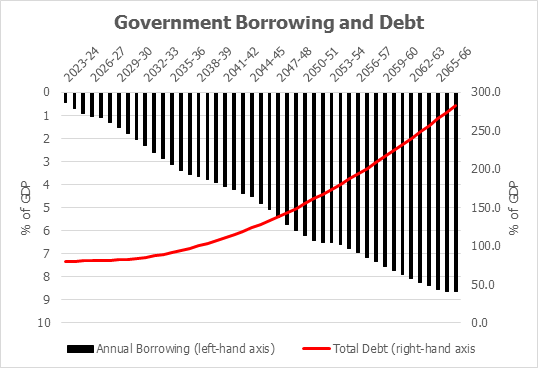The long-term outlook for government finances suggests tax increases are inevitable.
The Office for Budget Responsibility (OBR) produces medium-term financial forecasts alongside the Budget and Spring Statement, but that is not its only task. It is also required to take a longer-term view of the public finances, producing a Fiscal Sustainability Report every two years.
The latest version of the report was published in mid-July and did not make for comforting reading. The graph is a good summary of the bad news:
- The black lines show the projected government borrowing as a percentage of the size of the UK economy. In 2017/18 annual borrowing was 1.9% of Gross Domestic Product (GDP). By 2067/68 it becomes 85.6%.
- The red line shows the total amount of government debt, also as a proportion of the UK economy. As at May 2018, total borrowing was 85.0% of Gross Domestic Product (GDP). By 2067/68 it becomes 282.8%.
In the report, the OBR says, “Needless to say, in practice policy would need to change long before [2067/68] to prevent this outcome.” That means reduce expenditure and/or increased taxation.
Reductions in expenditure are unlikely, as much of the rise is driven by the costs of caring for an ageing population. In the short term increasing taxes is also hard to imagine, given the current political climate. In the longer term tax rises appear unavoidable, based on the OBR’s calculations. The first indications of what form tax rises might take could emerge when the Chancellor gives his response to the OBR in the Autumn Budget.
If you are looking for any solace, it is best sought in mathematics: these types of long-term projections are highly sensitive to relatively small changes in the underlying assumptions. If the UK economy were to grow faster than the 2.2% the OBR has assumed, the situation improves significantly. Alas, the opposite is also true.
With the UK’s growth rates remaining low, however, it seems likely the government will need to take some kind of action soon.
The value of tax reliefs depends on your individual circumstances.
Tax laws can change.
The Financial Conduct Authority does not regulate tax advice.
Content correct at time of writing and is intended for general information only and should not be construed as advice.

